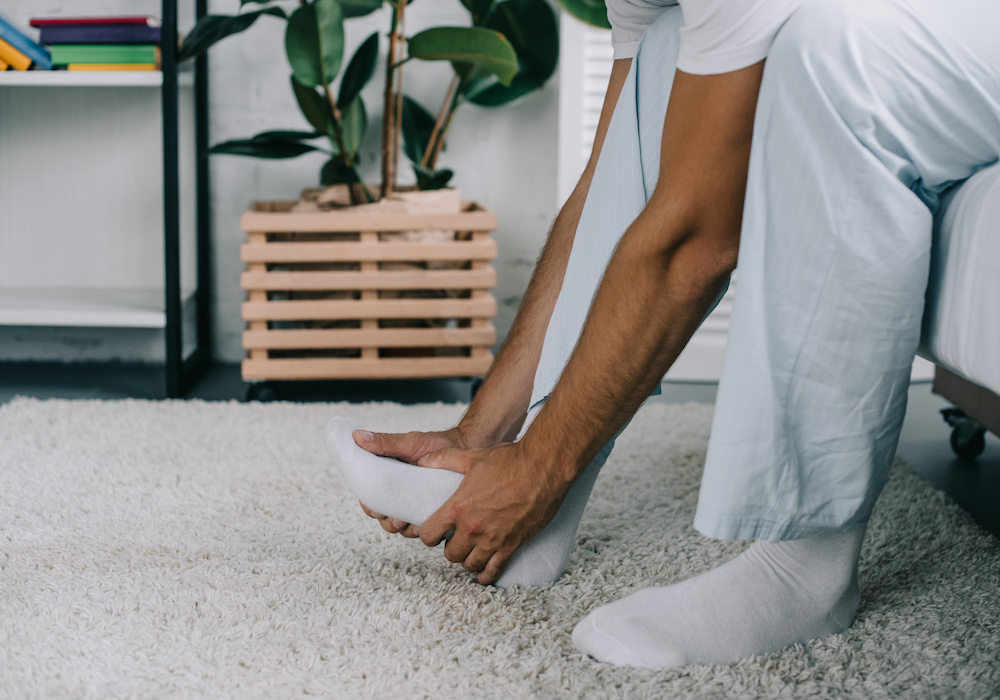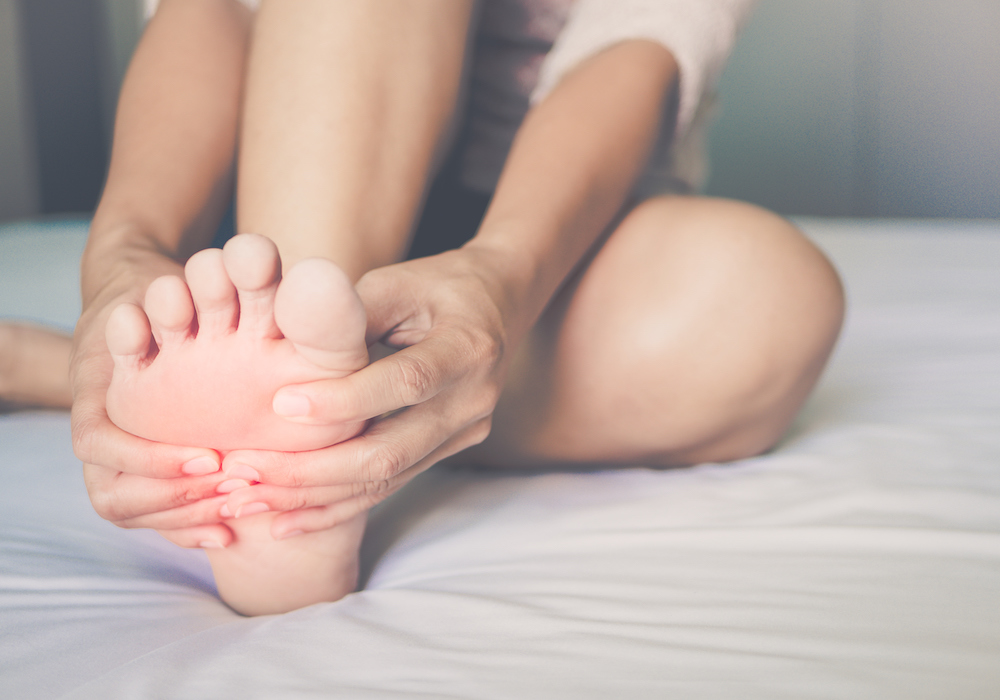THIS POST IS PART OF THE ULTIMATE GUIDE TO FOOT AND ANKLE INJURIES
Plantar fasciitis is a condition affecting the bottom of your foot. When inflammation of your plantar fascia causes foot pain, it makes daily tasks like walking and getting out of bed difficult.
Two million patients are treated for plantar fasciitis pain each year. The condition is the most common cause of heel pain, according to OrthoInfo.
OrthoIndy foot and ankle specialist, Dr. David Myer says plantar fasciitis recovery begins with nonsurgical treatment and often your doctor will suggest supportive shoes, insoles or night splints to help your level of comfort.
MAKE AN APPOINTMENT WITH A FOOT AND ANKLE SPECIALIST
What is plantar fasciitis?
Plantar fasciitis can cause a nagging pain on the bottom of your foot, making certain footwear difficult to wear. Your physician may suggest supportive shoes, insoles or night splints so your feet are more comfortable.
Orthopedic shoes or insoles won’t correct your problem, but they will help you manage your pain while you work, exercise or take part in activities.
Learn more about plantar fasciitis: symptoms and treatment >
Foot Anatomy
The plantar fascia is the long, thin ligament that supports the arch of your foot and lies directly beneath the skin on the bottom of the foot. Plantar fascia absorbs the high stresses and strains we place on our feet.
Inflammation of the plantar fascia ligament will irritate the bottom of your foot, causing pain.

Orthotic shoe or insole – what should I look for?
Whether your plantar fasciitis pain just began, or you’ve been experiencing it for years, your doctor may suggest a comfortable shoe or shoe insoles. There are a few key factors to remember when you are choosing a shoe or insole.
Some of those factors include:
- Good arch support
- Extra heel support
- Soft ground impact
- Firm heel counter
- Cushioning in your midfoot
- An extra rigid sole
MAKE AN APPOINTMENT WITH A FOOT AND ANKLE SPECIALIST
What are the best shoes for plantar fasciitis?
The best shoes for plantar fasciitis include increased support and stability for your foot and ankle. Wearing minimalist shoes like flip flops put stress on your heel bone and can worsen plantar fasciitis.
Dr. Myer explains why to avoid shoes like flip flops when looking for arch and heel support.
“Before slipping on flip flops, consider the type of activity you plan to do during the day,” Dr. Myer said. “If you’re going to be on uneven surfaces, or doing any sort of athletic activities, flip flops are probably not the best choice.”
If you’re an avid runner or on your feet all day and you develop plantar fasciitis, you may consider more rest as part of your routine to stop the irritation and slow down the inflammation. Considering a thicker cushion in your shoe will help absorb the shock of your daily activities and support your foot and ankle.
Regardless of your activity level, you are looking for shoes with arch and heel support and a rigid sole to prevent movement. Soft ground impact is also important to keep your feet from the “shock” of walking or running.
Finding a local shoe store to test your gait and your foot so they can fit you with the correct shoe to help with plantar fasciitis relief.
What are the best insoles for plantar fasciitis?
If you don’t want to buy a pair of orthotic shoes for your plantar fasciitis, insoles are an appropriate choice. Most insoles fit right inside the bottom of your shoe to give you the extra support you need and are designed to be removable. Removable insoles give any shoe the ability to be a good shoe for comfort and stability.
You can get your feet fitted for insoles, so they’re specific to your foot, but trying over the counter insoles first is cheaper.
If you want custom insoles for your plantar fasciitis, you will most likely need a doctor’s prescription. Ask your foot and ankle doctor whether inserts are right for your plantar fasciitis pain.
What are night splints?
If shoes or insoles are not something that fits your lifestyle, your foot and ankle doctor may suggest night splints. Night splints keep the angle between your foot and leg at a 90-degrees. Your night splint fits around your foot like a sock with the heel cut out of the back.
A band stretches from the top of the ankle to the front of your big toe, keeping your toes in the air and your ankle straight when you walk. This causes your plantar fascia and Achilles to be constantly stretched. Passively stretching the plantar fascia promotes rest and healing.
This also helps with the first few steps in the morning. Stepping out of bed flat footed in the morning can be painful and aggravate your plantar fascia. Night splints can help prevent the microtears that occur with those first morning movements and help reduce pain and inflammation.
What is the best treatment for plantar fasciitis
Comfortable shoe inserts or night splints decrease pain and inflammation in your plantar fascia but won’t solve the problem. Your foot and ankle doctor may suggest non-surgical treatment along with wearing supportive shoes, inserts or night splints.
Some of these treatment options include:
- Rest
- Ice
- Anti-inflammatory medication such as ibuprofen
- Plantar fasciitis exercises and stretches
- Taping the foot
- Cortisone injections
- Physical therapy
Pain improvements should be felt in the first four to six months of treatment and your plantar fascia should heal with nonsurgical treatment within 12 months. In extreme cases, where there is little to no improvement after a year of treatment, your foot and ankle doctor may suggest surgery.
To schedule an appointment with Dr. Myer, please call 317.884.5174 or learn more about OrthoIndy foot and ankle treatment and Dr. Myer.
Schedule an Appointment with a Foot Doctor
Your well-being is important to us. Click the button below or call us to schedule an appointment with one of our orthopedic specialists. If your injury or condition is recent, you can walk right into one of our OrthoIndy Urgent Care locations for immediate care. For rehabilitation and physical therapy, no referral is needed to see one of our physical therapists.





